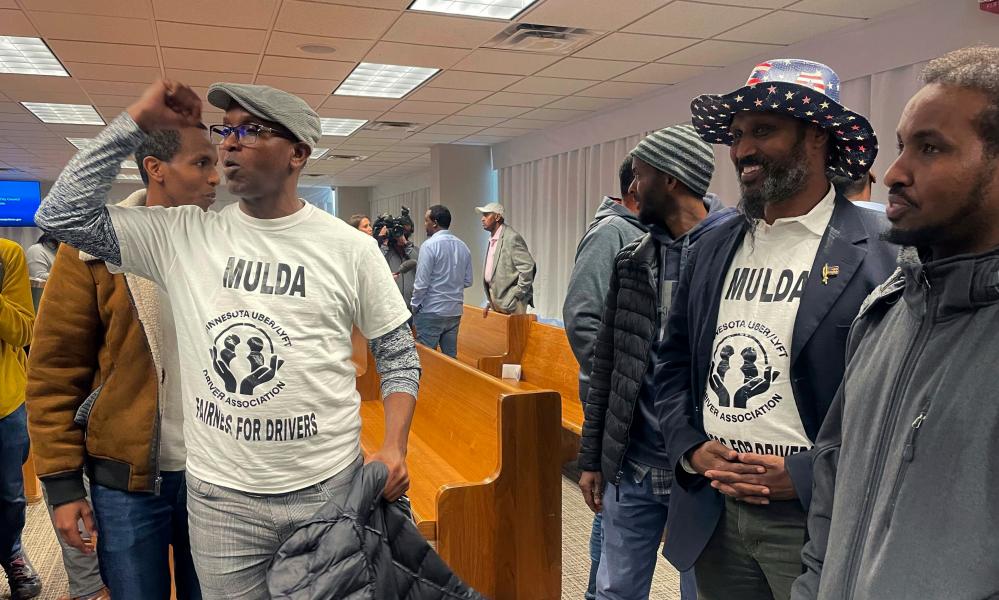The bill, to go into effect on 1 May, would establish a minimum pay of $1.40 per mile and $0.51 cents per minute for rideshare drivers, with a $5 per ride minimum. The city council voted to override the mayor’s veto of the ordinance, prompting Uber and Lyft to threaten to leave the region in response.
Related: Uber and Lyft to pay out $328m to New York ride-share drivers
Minneapolis would be the only city in the US without Uber and Lyft services if the rideshare companies uphold their threat to cease operations on 1 May.
The legislation was backed by groups of rideshare drivers over low pay and high costs amid reports their pay has been declining.
Eid Ali, a rideshare driver for nine years and president of the Minnesota Uber and Lyft Drivers Association dismissed claims from Uber and Lyft that the minimum pay is too high and would make passengers’ fees unsustainable.
“I refuse to believe a $7.3bn company [Lyft] cannot pay their workers minimum wage in our city. That is so difficult for me to swallow,” said Ali. “Every worker has the right to be paid a living wage.”
Ali said if Uber and Lyft ultimately leave, they would only be taking software with them and claimed other startups, companies and taxi cab companies have already expressed interest in trying to replace them.
“The drivers are here. Their cars are here. They’re not leaving,” said Ali. “Why I think they’re doing this is if they let the drivers here get what they want in this small market, it will have a bigger effect on their bigger, more lucrative markets. So they have to stop this. That is what their fight is based on. It’s not about the minimum wage, I believe it’s about how it will impact their bigger markets.”
Farhan Badel has worked as a driver for Uber and Lyft since 2018 said he enjoys working as a rideshare driver, but that he felt their role in society was severely undervalued.
He claimed that rideshare driver compensation in the area has declined in recent years, noting that the takeaway pay for driving a common route from the airport to the Mayo Clinic has dropped significantly. Badel argued he has been working longer hours and getting paid less than he did years ago and that the rideshare apps have been exploiting rideshare drivers who are predominantly from immigrant communities in the Minneapolis area.
“Uber and Lyft, it seems they want to turn this into riders versus drivers, but the reality is a lot of the riders understand that they are overpaying, they’re getting overcharged, while we’re getting underpaid. That’s what our struggle is,” said Badel. “All we’re asking for is fair compensation. They decide what to charge the riders, we don’t have control over what they charge the riders. All we’re asking for is a fair wage. If they’re charging the rider $90 and only giving us $20, that is what they’re fighting against.”
Republicans in the Minnesota legislature have already introduced a bill to pre-empt the regulations in Minneapolis, aimed at keeping Uber and Lyft in the region.
Josh Gold, senior director of public affairs at Uber, said: “We are disappointed the council chose to ignore the data and kick Uber out of the Twin Cities, putting 10,000 people out of work and leaving many stranded. But we know that by working together with all stakeholders – drivers, riders and state leaders – we can achieve comprehensive statewide legislation that guarantees drivers a fair minimum wage, protects their independence and keeps rideshare affordable.”
A spokesperson for Lyft added they are also supporting a state-level pre-emption.
“This deeply-flawed bill has been jammed through despite major concerns being raised by the community,” said the spokesperson in an email. “We support a minimum earning standard for drivers, which is why we recently announced a commitment where drivers will always make at least 70% of the weekly rider fares after external fees. However, this ordinance would make rides unaffordable for the majority of Minneapolis residents. The drastic drop in rides means the thousands of drivers who rely on Lyft for earnings would ultimately make less, creating an unsustainable situation for our customers.”
Rideshare corporations have been at loggerheads with regulators across the US and abroad. There have been several instances where Uber and Lyft have threatened to leave jurisdictions over regulations often aimed at resolving scrutiny over low pay and working conditions of drivers.
